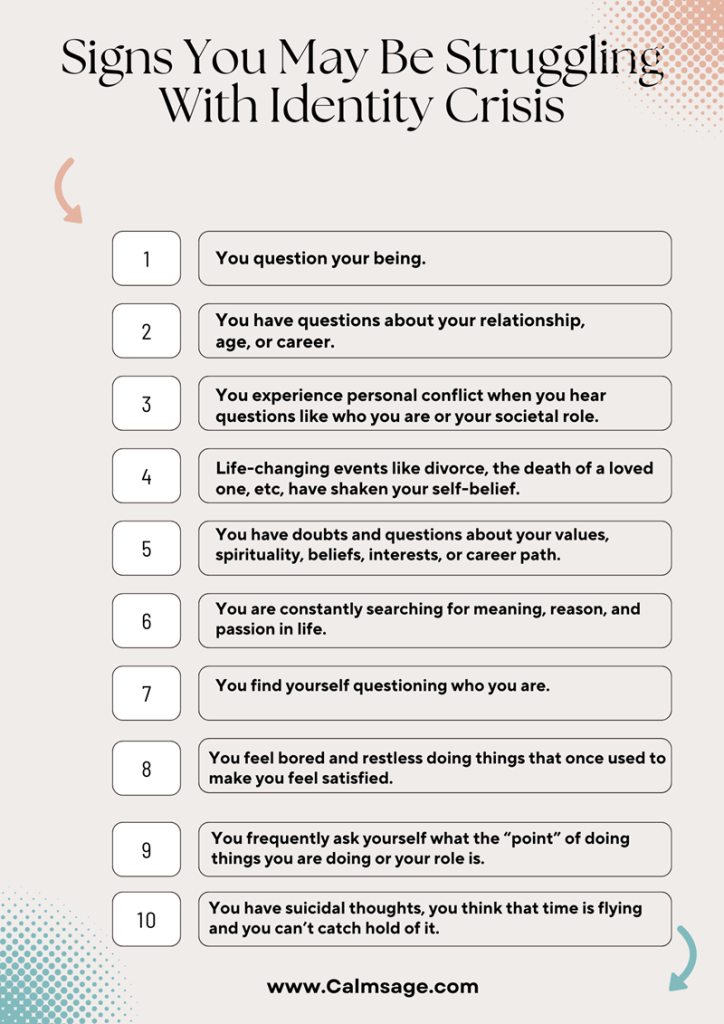How To Recognize And Cope With Identity Crisis

Have you ever questioned your self-worth and identity, asking who you are and the purpose for which you were born? If so, you might be struggling with an identity crisis, a phase most people usually in their teens go through. Sometimes, a major life event like retirement, an accident, trauma, the loss of a loved one, or a new phase in life can also make one question their identity.
If you can relate to what we are saying, read this post till the end. Here, we discuss an identity crisis and ways to cope with it.
What is an identity crisis, and what does it look like?
The term “identity crisis” was introduced by psychologist and psychoanalyst Erik Erikson. He introduced the ideas of adolescent identity crises and midlife crises, believing that personalities develop when the solution to a crisis in life is found.
When an individual goes through an identity crisis, everything looks chaotic to you and others. Simply put, you are on a quest to find yourself; hence, you try different roles that change your values, and a conflict with the old ones arises. Also, you start to feel uncertain about who you are and where you will fit.
When you are stuck in the cycle, the signs of identity crisis start to show up, and you find yourself in a state of confusion. Luckily, by attaining a higher level of maturity and having a strong sense of self, passing through phases becomes easy.
What is an identity crisis about?
An identity crisis is about finding oneself. This is why, during this condition, the individual gets bored or disillusioned with things that used to mean a great deal, such as:
- Values
- Roles one performs at home or work
- Relationships
- Beliefs
- personal or professional goals
- Activities
- Role models
Signs You May Be Struggling With Identity Crisis
Identity crisis is not diagnosable; hence, it does not have symptoms like you have in a cold or flu. However, certain signs might help understand if you or someone you know is experiencing an identity crisis.
When you are on the path of self-exploration, discovering what it means to be you, the emotions and thoughts you experience and feel vary from person to person. No one size fits all, and there are also no rules. Everything you feel is extremely personal and unique.
An adolescent, when going through an identity crisis, is seeking answers for who am I and what should I do, whereas an adult who has undergone some traumatic event might have questions like, Why me? Why does it happens to me? This is why it is said that no one size fits all, and there are also no rules in terms of age.
However, some common signs might point out that you are struggling with an identity crisis.
- You question your being.
- You have questions about your relationship, age, or career.
- You experience personal conflict when you hear questions like who you are or your societal role.
- Life-changing events like divorce, the death of a loved one, etc, have shaken your self-belief.
- You have doubts and questions about your values, spirituality, beliefs, interests, or career path.
- You are constantly searching for meaning, reason, and passion in life.
- You find yourself questioning who you are.
- You feel bored and restless doing things that once used to make you feel satisfied.
- You frequently ask yourself what the “point” of doing things you are doing or your role is.
- You have suicidal thoughts, or when struggling with a midlife crisis, you think that time is flying and you can’t catch hold of it.
- You constantly ask yourself who you are, where you fit, or where you belong.
- Have you made the right choice, and are you living up to your full potential?
These questions might seem normal, but when they begin to affect daily life functioning, it is a sign you are struggling with a crisis of identity.

Is an identity crisis the same as a midlife crisis?
A midlife crisis is an identity crisis, but not all crises happen around midlife. As people evolve and encounter different life experiences, they face different crises. According to Erikson, the midlife crisis could develop during Erikson’s seventh stage, which occurs between the ages of 40 and 65. Moreover, the idea of an identity crisis also raises questions about mental health in the 21st century.
When you realize you are growing old and time is running out, a sense of urgency is created, raising questions about life’s path. When you go through this, it is a midlife crisis, and you might have questions like:
- Is everything that was to be done accomplished by me?
- What will I leave behind?
- What is my legacy?
- Have I enjoyed life, or should I be enjoying it?
- Should I try new things?
- Is it too late to start something new?
- Have I lived a fruitful life?
Is identity crisis a good thing?
According to Erikson, encountering a developmental crisis is a chance to grow personally. Though facing it is not easy once the person learns to sail through the highs and lows of life, no one can stop him/her from achieving whatever they desire.
A developmental or identity crisis is an opportunity to take control of life, renew self-confidence, and see whether or not you are walking on the right path. It is a chance for self-introspection, making corrections, and making life easy.
In a nutshell, an identity crisis is a chance to make positive improvements in life.
Ways to cope with an identity crisis
Feeling uneasy by the word crisis is natural, and there is nothing wrong with getting overwhelmed because the word implies urgency, which shouldn’t be ignored.
However, some ways can help cope with it.
1. Self-evaluation
When dealing with a crisis, underestimating yourself is obvious, but never let it pull you down. Consider a crisis as an opportunity to grow. Remember that a crisis is a way to explore more options and become proficient. Identity crisis will help you understand that different phases of life bring different challenges, and each time you solve them, you grow.
Remember that a crisis is a natural occurrence and beneficial for your growth. Accept the feelings that come with it, and stop being critical and judgmental about yourself. Your roles and responsibilities have meaning; if you want to learn something new or change values, it is okay. There is nothing wrong with progressing and changing.
2. Talk with others
Remember, you are not the only one struggling with a crisis. Everyone faces different types of crises in their lifetime. Some handle it efficiently, while some get depressed. Talk to your friends and discuss your crisis with them. You never know who can help; their experiences might give you an idea and feel relaxed. Hence, never hold onto things, share them with your friends, and seek an answer for your crisis.
3. Reach out to a mental health professional.
Some people might not be able to overcome the crisis alone, which is when the therapist comes into play. Psychologists help deal with the situation, and they even see the signs of depression that you might be feeling due to an identity crisis. Remember, depression and identity crises are not the same.
If you are struggling with an identity crisis, you may feel existential despair or clinical depression.
If you’re feeling hopeless and your thoughts are mostly of sadness, meeting with a mental health specialist can help you identify whether you’re going through an identity crisis.
Questioning your sense of self can be difficult, but it can also be beneficial in the long run. Knowing yourself and responding to change can help you grow.
4. Introspect
Examine yourself and ask questions about what you enjoy and dislike.
To help you sort things out, ask yourself questions and see if you can answer them over time. Remember that you don’t have to know all the answers – they may vary yearly or decade to decade.
Questions might include:
- What attributes and qualities identify you? How has this evolved?
- Describe how things have altered if you’re going through a huge life shift. Are you happy with the changes? How will you deal with these new developments?
- What are your core beliefs? Is there anything working against them?
- What are your hobbies, interests, and passions? Are you doing what you enjoy? If not, why not? (What circumstances hinder you from playing tennis if you enjoy it but haven’t done so in several years?)
- What keeps you grounded? What helps you deal when you’re feeling down?
- What is significant about your values, life purpose, or sense of self? Is there anything you believe you can do to increase your self-esteem?
5. Search for joy
Find things that make you happy. Look for things that add a purpose to life and make you feel joyful. Even when you think you don’t have a perfect job or aren’t fulfilling any purpose, you are capable of certain things. Look for them.
Feeling hopeless is natural when in crisis, but don’t let this feeling overpower you. Start looking for things that make you feel fulfilled, start a new hobby, connect with others, and do things that make you feel complete.
6. Find support
Having a great social back can assist and impact how well you adapt to changes, stressors, or personality questions. There are numerous places where you can find support.
Look for support in:
- Friends, accomplices, and family members
- Your society or community
- Club, support group, or meetup
- Team sports
- Mental health groups or therapies
- Ignore inner and outside judgment
What others expect of us influences our feelings; hence, never let society dictate rules, as it can impact your thought process. Just because you are of a certain age or belong to a cultural group, you should behave in a manner they have set for you.
Self-perception is critical to your well-being; invest time and energy in understanding things. People might take time to adjust to the change, but if this makes you happy, feel joyful and be genuine to yourself.
7. Seek outside help
If the stress becomes too much, consider getting outside help. This is one way to have a trusted friend or family member, someone you can talk to, or a mental health professional to help you process and deal with what’s happening.
Don’t be afraid to ask for help. Life, especially big changes, can be scary, but we all experience them.
The Takeaway
Your personality is your sense of who you are, both as a person and in connection to others and society. Your character incorporates your characteristics, encompassing who you are physically, rationally, and in your connections. The social parts you play are too a portion of your character. Other viewpoints of who you are also frame your character, such as your one-of-a-kind recollections and elucidations of them, your values, and the long-term objectives you seek.
How you see yourself, too, depends on what you anticipate out of life and from yourself and others, as well as your essential beliefs. No one else has the same character as you are doing. Moreover, since your identity emergency is around you as a person, treatment for you alone may essentially assist you.




















